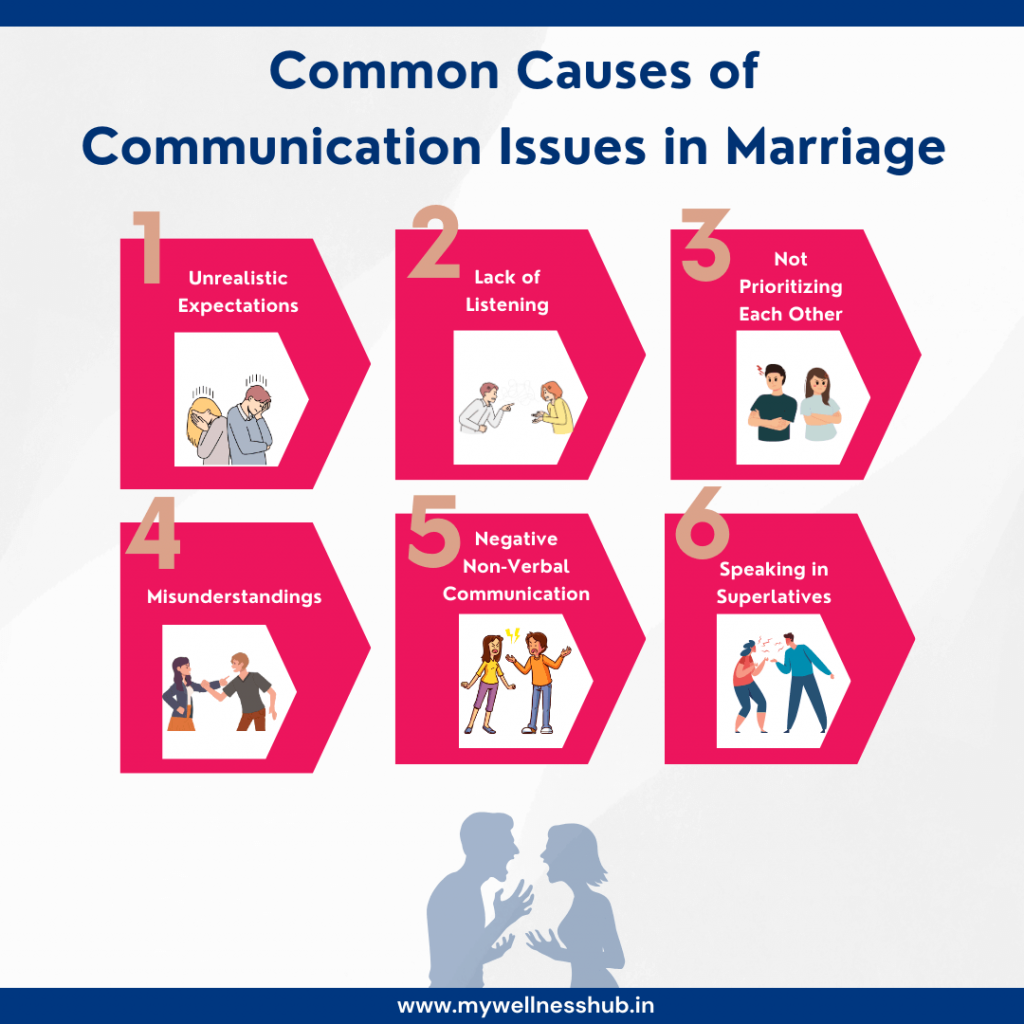How to Handle Communication Issues in Your Marriage
By Prapoorna M
Last Updated: May 31, 2024
Communication issues are common in marriages, right? At some point, we’ve all found ourselves in situations where words get tangled and misunderstandings arise. Whether it’s about small daily matters or significant life decisions, miscommunication can easily lead to frustration and conflict.
In any healthy marriage, effective communication is the key to a strong, lasting relationship. It’s the bridge that connects you and your partner, allowing you to understand each other’s needs, emotions, and thoughts. But when that bridge starts to falter, it can feel like you’re speaking entirely different languages, leading to disconnection and unhappiness.
Common Causes of Communication Issues in Marriage

Even the strongest marriages encounter communication issues from time to time. It’s important to recognize common stumbling blocks and understand how to navigate them.
1. Unrealistic Expectations
It’s easy to set high expectations for our partners, but when these expectations aren’t met, disappointment can set in and hinder communication. Expecting your spouse always to know what you want or to behave in a certain way can lead to misunderstandings.
How to Manage Expectations:
- Communicate Your Needs: Instead of assuming your partner knows what you want, clearly express your desires.
- Be Realistic: Understand that no one is perfect, and adjust your expectations accordingly.
- Appreciate Efforts: Recognize and appreciate what your partner does rather than focusing on what’s missing.
2. Lack of Listening
One of the most important aspects of effective communication is listening. When we don’t actively listen to our partners, communication breaks down.
Common Poor Listening Habits:
- Interrupting while the other person is speaking.
- Focus on what you want to say next instead of understanding your partner’s words.
- Showing disinterest through body language or distractions.
How to Improve Listening:
- Practice Active Listening: Focus on your partner’s words and reflect back on what you heard to ensure understanding.
- Avoid Interrupting: Allow your partner to finish their thoughts before responding.
- Show Interest: Maintain eye contact and nod to show you’re engaged.
3. Not Prioritizing Each Other
When life gets busy, it’s easy to neglect your partner’s needs, which can harm communication.
How Neglect Affects Communication:
- This leads to feelings of being unimportant or undervalued.
- Creates emotional distance between partners.
- Reduces opportunities for meaningful conversations.
How to Prioritize Each Other:
- Set Aside Quality Time: Regularly schedule time together, even if it’s just a few minutes each day.
- Be Present: When you’re together, focus on each other without distractions.
- Show Appreciation: Regularly express gratitude and affection.
4. Misunderstandings
Miscommunications often lead to conflict. When we’re not clear in our communication, our words can easily be misunderstood.
How to Avoid Misunderstandings:
- Clarify Intentions: If your partner seems confused or upset, clarify what you meant.
- Ask Questions: If you’re unsure of what your partner means, ask for clarification.
- Be Clear: Avoid vague or ambiguous language.
5. Negative Non-Verbal Communication
Our bodies often say more than our words. Negative body language can create misunderstandings and conflict.
Examples of Negative Body Language:
- Crossing arms or avoiding eye contact.
- Rolling eyes or sighing.
- Turning away or appearing disinterested.
How to Improve Non-Verbal Cues:
- Be Open: Use open body language, such as uncrossed arms and facing your partner.
- Show Engagement: Make eye contact and nod to show you’re listening.
- Be Aware: Pay attention to your own non-verbal cues and how they might be perceived.
6. Speaking in Superlatives
Using exaggerated language, such as “always” or “never,” can harm communication and make problems seem bigger than they are.
How to Balance Communication:
- Use Specifics: Instead of generalizing, focus on specific incidents or behaviors.
- Avoid Blame: Use “I” statements instead of “You” statements to express feelings without blaming.
- Stay Calm: Avoid escalating the conversation with dramatic language.
By being mindful of these common communication pitfalls, you can start to address issues and improve communication in your marriage.
Also Read: Online Marital Counselling
Handling Communication Issues in Marriage
At this point, we’ve discussed some common causes of communication issues in marriage. Now, let’s explore how to handle these challenges effectively.
1. Identify the Issue
The first step to resolving communication issues is pinpointing the specific problem. It’s crucial for couples to identify what’s really bothering them rather than letting frustrations build up.
- Recognize Patterns: Look for recurring issues that cause friction.
- Be Honest: Openly discuss what’s bothering you, even if it feels uncomfortable.
- Seek Clarity: Ask your partner to share their concerns as well.
2. Practice Active Listening
Effective communication hinges on good listening skills. Often, partners are more focused on what they want to say rather than understanding their spouse.
- Give Full Attention: Maintain eye contact and put away distractions.
- Reflect Back: Paraphrase what your partner has said to show you’re listening.
- Avoid Interrupting: Let your partner finish speaking before responding.
3. Address Bottled-Up Feelings
When feelings are kept inside, they can lead to misunderstandings and resentment. It’s important to create a safe space for open communication.
- Encourage Expression: Let your partner know they can share their feelings without judgment.
- Be Vulnerable: Share your own feelings honestly.
- Offer Support: Show empathy and understanding when your partner opens up.
4. Manage Emotions
Emotions can run high during conflicts, but it’s essential to manage them constructively.
- Take a Break: If emotions are overwhelming, step away for a moment to cool down.
- Use Coping Skills: Practice deep breathing or mindfulness to calm down.
- Stay Calm: Focus on discussing the issue calmly and respectfully.
5. Focus on One Issue at a Time
Mixing multiple issues in one conversation can lead to confusion and frustration.
- Stay Focused: Stick to the main issue without bringing up unrelated topics.
- Resolve Fully: Address one issue before moving on to another.
- Be Clear: Clearly define the issue you want to discuss.
Explore more: 10 Powerful Couples Therapy Tips to Rekindle Your Love
6. Apologize and Express Gratitude
Sincere apologies and expressions of gratitude can go a long way in resolving conflicts.
- Apologize Sincerely: If you’ve hurt your partner, offer a genuine apology.
- Express Gratitude: Regularly show appreciation for your partner’s positive actions.
- Forgive Freely: Be willing to forgive your partner and move forward.
7. Connect Emotionally and Physically
Maintaining emotional and physical intimacy is crucial for a healthy marriage.
- Show Affection: Hold hands, hug, or share a kiss to maintain physical closeness.
- Be Emotionally Available: Offer a listening ear or comforting words when your partner needs support.
- Spend Quality Time: Engage in activities you both enjoy to strengthen your connection.
8. Seek Professional Help if Needed
If communication issues persist, couples therapy or marriage courses can provide valuable support.
- Consider Therapy: A licensed therapist can help you navigate communication challenges.
- Take a Marriage Course: Online courses or workshops can provide tools for improving communication.
- Reach Out for Support: Resources like Wellness Hub offer guidance for strengthening relationships.
Read more: Better ways to communicate in relationships
Comparing Communication Issues and Solutions
| Issue | Solution |
|---|---|
| Unrealistic Expectations | Communicate Clearly and Set Realistic Goals Openly discuss and align your expectations with your partner to avoid disappointment. Aim for realistic goals in your marriage. |
| Lack of Listening | Practice Active Listening Focus on what your partner is saying, avoid interrupting, and show that you understand their perspective. |
| Not Prioritizing Each Other | Schedule Quality Time Together Make an effort to set aside regular time for each other, free from distractions, to reconnect and communicate. |
| Misunderstandings | Clarify Intentions and Ask Questions When confused or unsure about your partner’s words or actions, clarify their intentions and ask questions to understand their perspective. |
| Negative Non-Verbal Communication | Improve Body Language Be mindful of your non-verbal cues, such as eye contact, facial expressions, and body posture, to convey positive communication. |
| Speaking in Superlatives | Use Balanced Communication Avoid using exaggerated language like “always” or “never.” Instead, focus on specific behaviors and use balanced, constructive language. |
Practical Tips for Effective Communication

1. Be Clear and Direct
Clear communication is key to avoiding misunderstandings and ensuring both partners’ needs are met. When you communicate openly, you avoid guesswork and foster understanding.
- Speak Clearly: Avoid vague or ambiguous language when expressing your needs or feelings.
- Be Honest: Share your thoughts and emotions honestly, even if they’re difficult to articulate.
- Ask for Clarification: If something isn’t clear, don’t hesitate to ask your partner to explain.
2. Use “I” Statements
Using “I” statements instead of “You” statements helps you take personal accountability and prevents blame-shifting in conversations.
- Take Responsibility: Use phrases like “I feel” or “I think” to express your own experiences.
- Avoid Blame: Steer clear of blaming language, which can put your partner on the defensive.
- Promote Understanding: Focus on expressing your own needs and feelings rather than pointing fingers.
3. Schedule Regular Check-ins
Setting aside regular time to discuss the relationship helps to address issues proactively and maintain a strong connection.
- Make it Routine: Schedule time regularly, such as weekly or monthly, to check in with each other.
- Discuss Openly: Use this time to talk about any concerns or challenges you’re facing.
- Show Appreciation: Take the opportunity to express gratitude and appreciation for each other.
4. Stay Calm and Respectful
Maintaining composure and respect during discussions is crucial for healthy communication. Even in disagreements, staying calm prevents escalation.
- Control Emotions: If emotions run high, take a break and return to the conversation when calmer.
- Be Respectful: Avoid name-calling, sarcasm, or other disrespectful behavior.
- Listen Patiently: Let your partner express themselves fully before responding.
5. Have Fun Together
Having fun and being playful with your partner strengthens your bond and improves communication.
- Be Spontaneous: Surprise your partner with a fun activity or a thoughtful gesture.
- Laugh Together: Share jokes or do something silly to lighten the mood.
- Enjoy Each Other’s Company: Spend time doing things you both enjoy, fostering positive communication.
These practical tips can greatly enhance communication in your marriage. By applying these strategies, you can strengthen your relationship and address any communication issues that arise.
Conclusion
In any marriage, communication is the foundation that holds everything together. We’ve looked at common causes of communication issues, like unrealistic expectations, not listening, and misunderstandings. We’ve also shared practical tips for better communication, such as being clear and direct, using “I” statements, and having fun together.
By addressing these issues and using these tips, you and your partner can build a stronger, more satisfying relationship. Remember, effective communication is a skill you can develop, and it’s worth the effort. Improved communication leads to deeper understanding, closer emotional bonds, and a happier marriage overall. For more help with your relationship, check out the Marriage Counseling section on Wellness Hub. We’re here to help you build a healthier, happier marriage.
Frequently Asked Questions:
1. How can we improve communication in our marriage?
Improving communication in marriage involves being clear and direct, practicing active listening, and making time for regular check-ins. Using “I” statements, staying calm during discussions, and showing appreciation can also help improve communication.
2. What causes communication problems in marriage?
Common causes of communication problems in marriage include unrealistic expectations, lack of listening, misunderstandings, and negative non-verbal communication. Stress, lack of intimacy, and emotional or physical neglect can also contribute to communication issues.
3. How do you handle communication issues in marriage?
To handle communication issues in marriage, identify the problem, practice active listening, address bottled-up feelings, and manage emotions. It’s also important to focus on one issue at a time, apologize sincerely, and maintain intimacy. Seeking professional help if needed can also be beneficial.
4. What are common communication problems in marriage?
Common communication problems in marriage include poor listening habits, speaking in superlatives, neglecting each other’s needs, bottling up feelings, and allowing misunderstandings to fester. Negative body language and a lack of emotional or physical connection can also lead to communication issues.
5. How can couples resolve communication breakdowns?
Couples can resolve communication breakdowns by first identifying the issue, practicing active listening, and addressing any bottled-up feelings. Staying calm, focusing on one issue at a time, apologizing, and expressing gratitude are also helpful. In more challenging cases, seeking couples therapy or marriage courses can provide additional support.
6. How can I encourage my partner to communicate better?
You can encourage your partner to communicate better by creating a safe and supportive environment, actively listening to them, and expressing appreciation for their efforts. Setting aside regular time for discussions and leading by example with clear and open communication can also be helpful.
7. What are some signs of poor communication in marriage?
Signs of poor communication in marriage include frequent misunderstandings, constant arguments, emotional distancing, lack of listening, and negative non-verbal cues like eye-rolling or crossing arms. If one or both partners often feel unheard or misunderstood, it indicates communication issues.
8. How can we rebuild trust after communication breakdowns?
To rebuild trust after communication breakdowns, focus on open and honest communication, apologize sincerely, and express gratitude. Setting clear boundaries, following through on promises, and seeking professional help if needed can also aid in rebuilding trust.
9. How does stress affect communication in marriage?
Stress can affect communication in marriage by making partners more irritable, less patient, and less focused on each other’s needs. When stressed, people might snap at their partner, withdraw emotionally, or misunderstand each other more easily, leading to communication issues.
10. How often should couples communicate about their relationship?
Couples should communicate about their relationship regularly, ideally setting aside time each week for check-ins. These conversations can help address any issues early on and maintain a strong connection, fostering open and effective communication in the marriage.
About the Author:
Prapoorna Mangalampalli
M.Sc., M.A., (Dual Masters in Psychology & English) – Counselor (6+ years of experience)
Prapoorna armed with a passionate dedication fueled by dual Master’s degrees in Psychology and English, Prapoorna sheds light on and elevates human experiences. Over 6+ years of experience fuel her insightful approach to counseling, offering profound empathy and guidance across diverse areas like online, marital, relationship, child, family, and career counseling.
At Wellness Hub, she thrives in a team environment that values innovation, compassion, and achieving results for their clients.
Connect with Prapoorna to learn how she can help you or your loved one find their voice and build a brighter future.
Book your Free Consultation Today
Parent/Caregiver Info:
Client’s Details:
* Error Message









